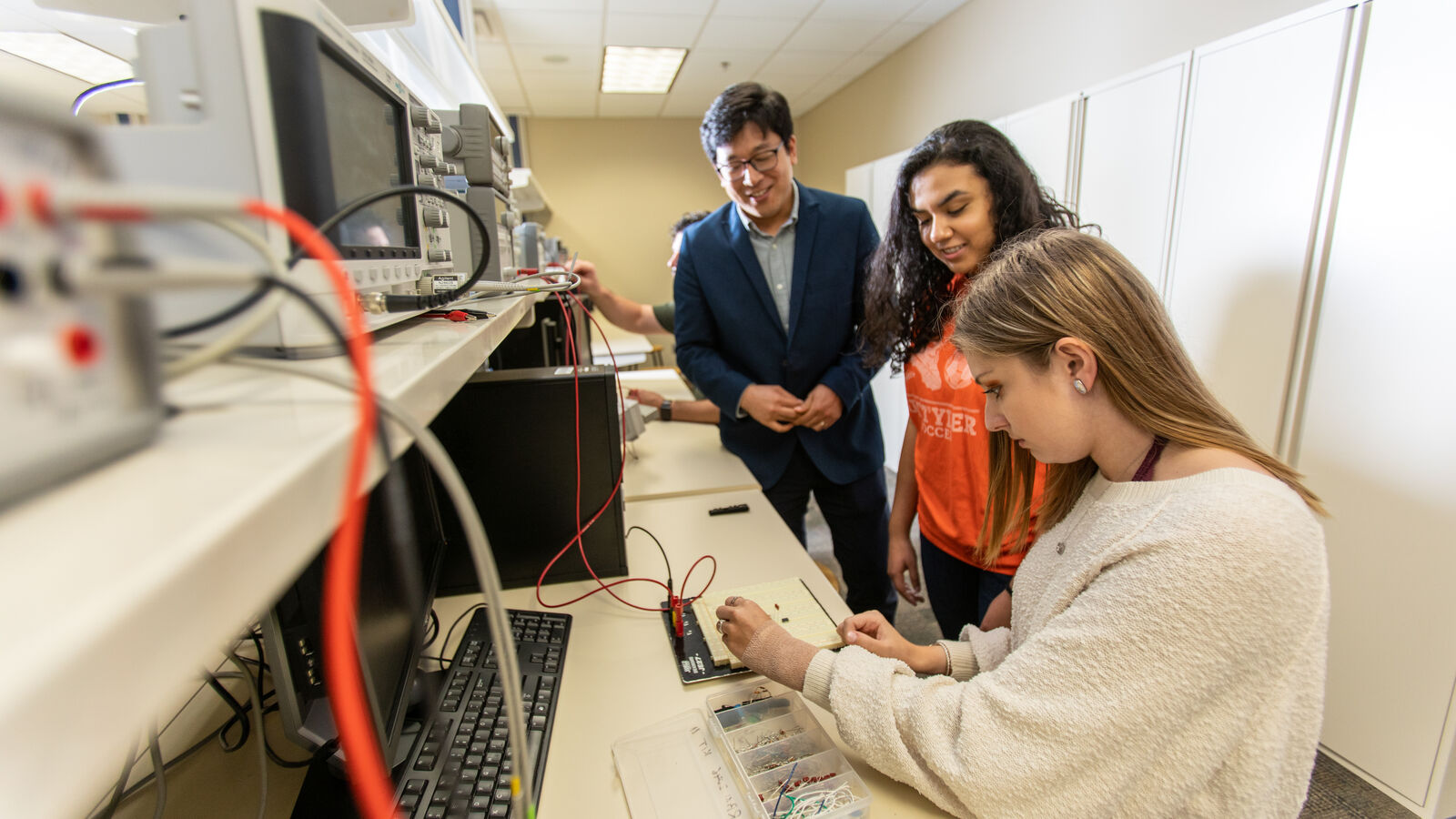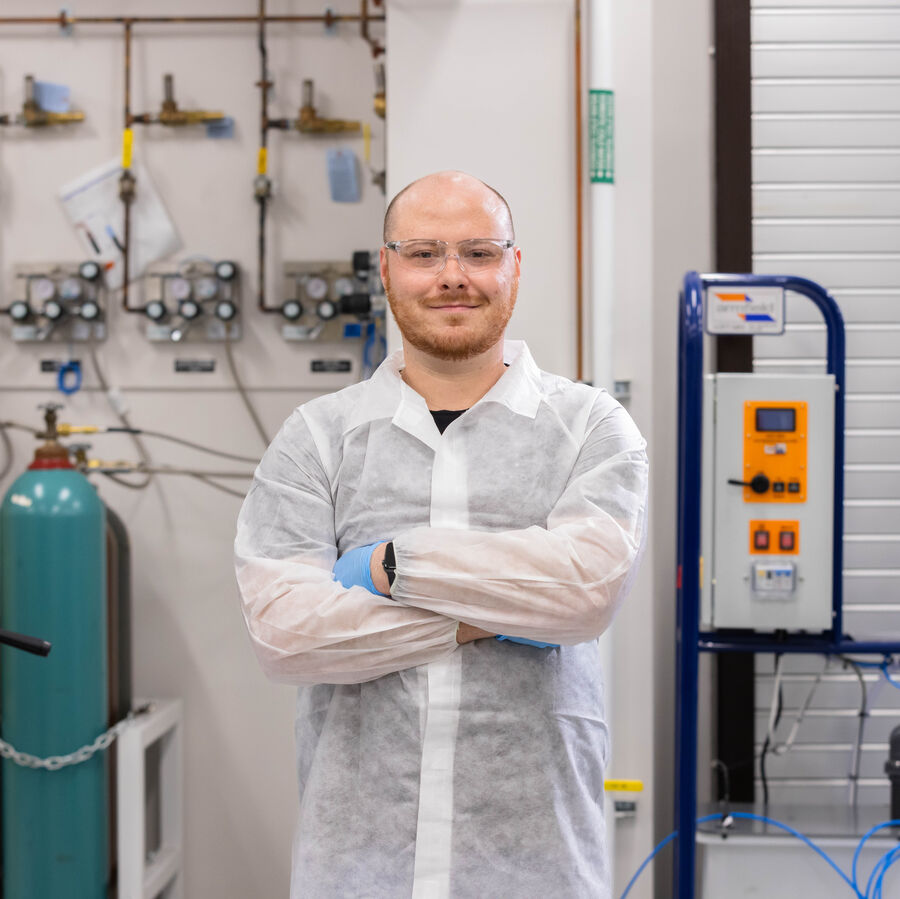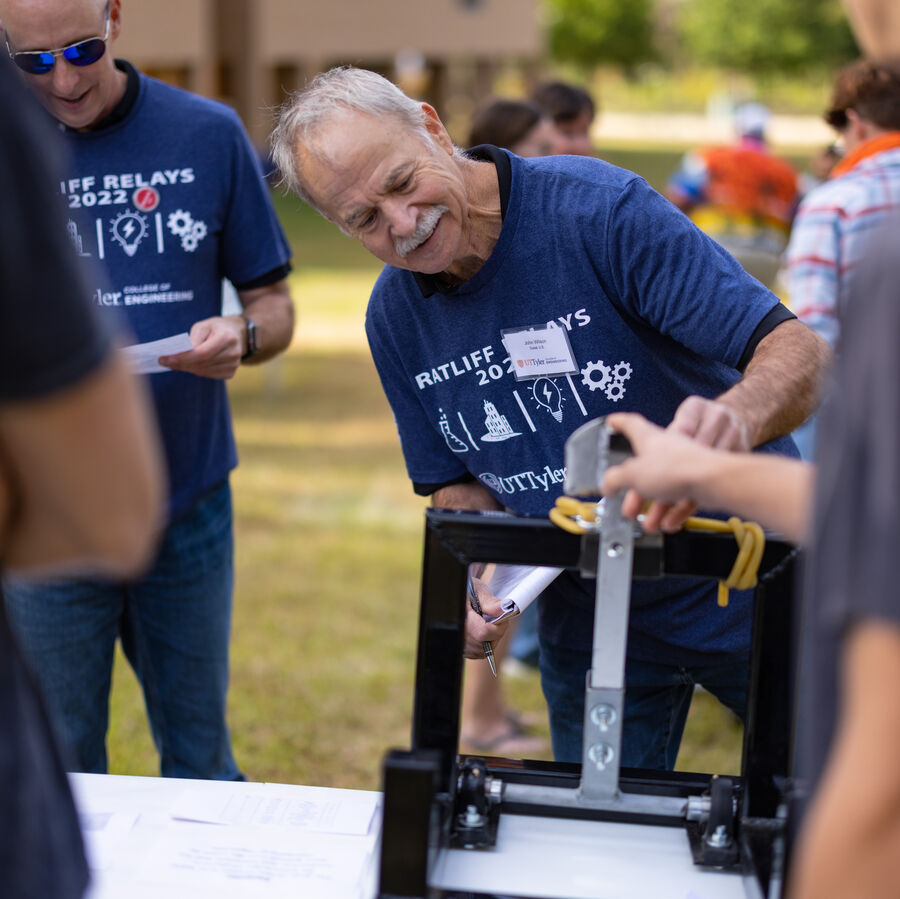
Bachelor of Science in Computer Engineering
Design and Build the Future
The Department of Electrical and Computer Engineering at The University of Texas at Tyler offers a student-focused, hands-on approach to undergraduate and graduate engineering education, providing excellent preparation for success in today's high-tech world. The Bachelor of Science in computer engineering (BS CMPE) has been designed to provide a strong basis for technical competence and depth in the computer engineering discipline.
Graduates will be able to apply the principles of computer science, physics and math to define and solve problems and design solutions in all areas of research, development, design and operation related to computer systems and their components, including both hardware and software.
Our graduates are involved in professional practice through the application of problem-solving skills, using relevant technology in their field. They demonstrate professional leadership skills through effective communication, critical thought, creativity and teamwork. They integrate engineering principles and social, business and ethical issues into modern society in the process of decision-making and are professionally engaged in serving the needs of business, industry, government and academic organizations.
Why Major in Computer Engineering at UT Tyler?
UT Tyler oversees the only computer engineering program in East Texas. With this new offering, the College of Engineering aims to produce qualified engineers ready to meet the high-tech needs of our region and state.
Our program’s strengths include:
- Nationally Ranked: U.S. News & World Report named UT Tyler’s College of Engineering one of the top 50 engineering programs in the U.S. For the second consecutive year, UT Tyler is the highest-ranked Texas public institution on the publication’s Best Undergraduate Engineering Programs (no doctorate) list.
- A Choice of Locations: Study at our main campus in Tyler, online or through our satellite program at the Houston Engineering Center, located on the Houston Community College campus.
- State-of-the-Art Facilities: Develop critical skills for your career in dedicated lab space and advanced facilities.
- Hands-on Experience: The program’s practical approach to engineering connects theoretical knowledge with real-world design applications. Expand your knowledge with practical assignments and internships.
- Undergraduate Research: Work with accomplished faculty researchers who enjoy inspiring students to solve problems by thinking outside the box.
- Robotics Team: Build and program a robot for competition as a student member of the Institute of Electrical and Electronics Engineers. Our team recently placed in the top 10 in an IEEE robotics contest that included collegiate teams from 11 states.
Curriculum
The computer engineering major pairs a strong theoretical foundation with rich, hands-on experience. Coursework builds practical engineering skills, and assignments strengthen the communication and teamwork abilities employers expect from new hires.
The BS in computer engineering (BS CMPE) program prides itself on:
- Modern, cutting-edge curriculum offerings in high-demand areas.
- Distinguished faculty with industry and research experience.
- A Student Enrichment experience requirement — complete an industry internship or a research project.
- Dedicated career services support in the engineering college.
- Vibrant student life with professional organization activities.
- Undergraduate research experience opportunities with faculty.
- Affordable tuition and cost of living with small class sizes.
Students develop an understanding of the design, development and applications of computer systems, including hardware, software and hardware-software interaction. They learn to evaluate trade-offs and optimize systems based on system requirements.
We offer cutting-edge, hands-on courses in Computer Architecture, Digital Electronics, Embedded Systems, Data Communications and Networking, Signals and Systems, VLSI Design, FPGA Design and Operating Systems, culminating in a capstone Senior Design project. Students are also required to complete an enrichment experience with an industry internship or faculty-supervised research experience.
The College of Engineering extends a 4+1 option to students interested in starting work toward a master's degree in their senior year.
Computer Engineering Major Requirements
What Can You Do With a Bachelor’s Degree in Computer Engineering?
Graduates experience demand due to their expertise in integrating hardware and software systems. According to the U.S. Bureau of Labor Statistics, computer engineering professionals earned a median salary of $128,170 as of 2021.
Computer engineering encompasses all areas of research, development, design and operation of computer systems and their components, including both hardware and software. Computer engineering graduates are sought by all major industries and work as computer hardware engineers, computer network architects, and computer and information research scientists. The state of Texas has the third-highest employment level for computer hardware engineers in the country, the second-highest employment level for computer network architects and the fifth-highest employment level for computer and information research scientists.
Graduates hold many important and challenging positions in computer design, telecommunications, information technology, electronics, defense, aerospace, automotive, financial services, computer manufacturing, chemical companies, consulting, transportation, manufacturing and consumer goods. Computer engineers are equally successful in large multinational firms and small startups. The employment rate for computer engineers in the state of Texas is projected to increase by 15.52% over the next decade.
Some graduates may choose to advance their knowledge in a related master’s program, including in electrical, systems or computer engineering.
How to Apply
The University of Texas at Tyler offers a streamlined admissions process for all undergraduate students. Have questions or concerns? Our admissions team can guide you through all requirements and answer any questions you may have. Reflecting our reputation as one of the most affordable colleges in the state, our financial aid team helps you explore all scholarships, grants and other forms of assistance.
For admissions decisions in general:
- UT Tyler automatically accepts students from the Top 25% of graduating classes in Texas.
- Students from the 2nd to 4th quartiles must have a 2.75 or higher GPA.
Ready to apply? Review all undergraduate requirements to get started.
Start Your ApplicationUT Tyler has established partnerships with community colleges across Texas, allowing for a seamless transfer of your credits. Our relationships let you stick with your degree plan and graduate on time, right on your schedule.
UT Tyler has partnered with Tyler Junior College and Houston Community College to create a direct pathway toward the Bachelor of Science in computer engineering degree.
Students who have earned an associate of engineering science degree from an ANSAC/ABET-accredited program at a participating Texas community college with no grade lower than a “C” are eligible to pursue the Computer Engineering Completion Program to earn a Bachelor of Science in computer engineering. This pathway enables students to begin their engineering education at a participating community college and complete their bachelor’s at UT Tyler.
Through UT Tyler’s partnership with Houston Community College, students have the opportunity to earn a Bachelor of Science degree in engineering at the UT Tyler Houston Engineering Center, located on the second floor of the HCC Alief Hayes Campus in Houston.
Students begin coursework at HCC and receive an associate degree before transferring to UT Tyler. As a student considering this pathway, you then select from majors in mechanical engineering, electrical engineering, civil engineering, computer engineering or construction management to finish your bachelor’s at the HEC.
Undergraduate students majoring in computer engineering may choose to complete a master’s degree in electrical engineering in one additional year. Students admitted into the program take nine credits of graduate coursework during their senior year, plus one credit of undergraduate research seminar, and must obtain a grade of “B” or higher in all graduate-level subjects attempted during their senior year to continue on to the master’s program. Those taking this pathway complete two credentials in five years’ time.
July 1
ApplyTexas application opens for incoming first-year students.
July 15
Deadline for fall Talent Scholarship application.
October 1
The Free Application for Federal Student Aid opens for the upcoming academic year.
December 1
Application deadline to be eligible for scholarships. Deadline for spring Talent Scholarship application.
April 15
Deadline for summer Talent Scholarship application.
May 1
Deadline for Valedictorian, Salutatorian and Transfer Presidential scholarships.
August 1
Deadline for Patriot Promise Scholarship.
Explore Related Programs
Next Steps
Take charge of your future. Discover all the places a computer engineering degree from UT Tyler can take you.


